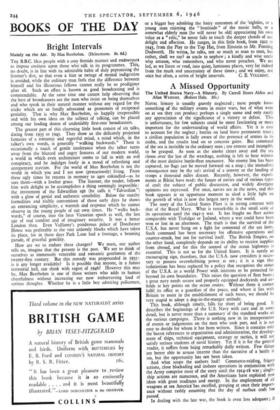BOOKS OF THE DAY
Bright Intervals
Mainly on the Air. By Max Beerbohm. (Heinemann. Ss. 6d.)
THE B.B.C. likes people with a cosy fireside manner and endeavours to impose cosiness upon those who talk in its programmes. This, no doubt, is in line with its admirable habit of duly peptonising the listener's diet, so that even a hint or twinge of mental indigestion is avoided, while the ordinary man feels that the difference between himself and his illustrious fellows cannot really be so prodigious after all. Such an effect is known as good broadcasting and is commendable. At the same time one cannot help observing that the best of broadcasters are the men who insist on being themselves and who speak in their natural manner without any regard for the tricks which are so fondly advocated as promoters of reciprocal geniality. That is why Max Beerbohm, so happily irrepressible and with his own ideas on the subject of talking, can be placed among our leading dozen of undeniably first-rate broadcasters.
The greater part of this charming little book consist of six talks, dating from 1935 to 1945. They show us the delicately projected fantasies of a romantic and regretful mind, a mind which, in the talker's own words is generally "walking backwards." There is occasionally a 'touch of gentle intolerance when the talker turns away from the blurted and angry features of our modern world, a world in which even architecture seems to fall in with an evil conspiracy, and he indulges freely in a mood of refreshing and unrepentant atavism. For the world of Max Beerbohm is not the world in which you and I are now. (precariously) living. From these ugly times he returns in memory to ages enkindled—as he sees them—with a livelier grace. The listener, the reader, follows him with delight as he accomplishes a thing seemingly impossible : the investment of the Edwardian age (he calls it Edvardian ") with a glow of genial and authentic sensibility. Below the starchy formalities and risible conventions of those early days he shows an entrancing simplicity, a warmth and response which he cannot observe in the young people of our own times. He "walks back- wards," of course, into the later Victorian epoch as well, the last age of real comfort and of imaginary security. It was a better London then. Even Vulliamy's ponderous palace of Dorchester House was preferable to the vast unlovely blocks which have taken its place, for in those days Park Lane had a frontage, a beaming parade, of graceful gentility.
How are we to endure these changes? We must, our author tells us, imagine that the present is the past. We are to think of ourselves as immensely venerable and romantic gentlemen of the twenty-first century. But this remedy was propounded in 1935: is it any longer available? Is it possible that anyone, in a future terrestrial hell, can think with regret of 1946? However this may be, Max Beerbohm is one of those writers who adds to human cheerfulness without increasing our now embarrassing load of serious thoughts. Whether he is a little boy admiring policemen, or a bigger boy admiiing the hairy statesmen of the 'eighties, or a young man enjoying the "beatitude" of the music halls, or a somewhat elderly man (he will never be old) appreciating his own value as a "relic," he never fails to touch the deeper chords of our delight and affection. He ranges, in this little book, from 1922 to 1945, from the Play to the Top Hat, from Einstein to Mr. Fanning Dodvvorth. He writes, he talks, not so much as man to man, but rather, shall we say? as uncle to nephew ; a kindly and wise uncle whg amuses, who remembers, and who never preaches. We are led, as we listen or read, into quiet, luminous places, very far indeed from the murk and uncertainty of these times ; and we enjoy, not
once but often, a series of bright intervals. C. E. VULLIAMY.


























 Previous page
Previous page